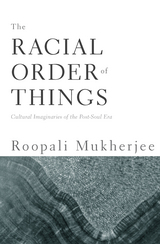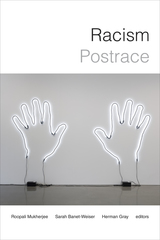2 books by Mukherjee, Roopali

The Racial Order Of Things
Cultural Imaginaries Of The Post-Soul Era
Roopali Mukherjee
University of Minnesota Press, 2006
Why did affirmative action programs implemented during the sixties and seventies suffer vicious assaults in the nineties? How were culturally resonant appeals to individualism and colorblindness turned around during the nineties to epitomize a “toxic system of quotas, preference, and set-asides”?In The Racial Order of Things, Roopali Mukherjee analyzes reversals and reinterpretations that mark the turn from the civil rights era of the sixties to the post-soul decade of the nineties. She begins by surveying a series of intractable disagreements over race- and gender-based social justice that have played out over the past decade, framed by the 1996 passage of California’s Proposition 209 and the 2003 Supreme Court decision on admissions criteria at the University of Michigan. Examining political campaigns for and against affirmative action as well as films about dilemmas of gender and race in the mythic meritocracy, the book exposes a remarkable discursive tug-of-war over antidiscrimination policies during the nineties.Highlighting the ways in which categories such as “blackness” and “women” have operated in these debates, Mukherjee sees the public policy process as a key site where cultural identities are formed, recognized, and discarded. Considering mainstream media, including Hollywood films like Disclosure, G.I. Jane, Courage under Fire, and The Contender, Mukherjee focuses on conflicts following the introduction of women and blacks into the workplace. She explores the politics of public memory about the civil rights era through the lens of feature film, documentary, and network news. Using newspaper articles and legislative records, Mukherjee provides a comparative reading of narratives and counternarratives of the debate surrounding the 1964 Civil Rights Act and anti–affirmative action campaigns of the neoliberal nineties.Balancing policy narrative, cinematic reading, and conceptual analysis, Mukherjee demonstrates a shifting and paradoxical racial order that explains how the cultural authority and political career of affirmative action remains in flux, thoroughly contested, and contradictory.Roopali Mukherjee is assistant professor of media studies at Queens College of the City University of New York.
[more]

Racism Postrace
Roopali Mukherjee, Sarah Banet-Weiser, and Herman Gray, editors
Duke University Press, 2019
With the election of Barack Obama, the idea that American society had become postracial—that is, race was no longer a main factor in influencing and structuring people's lives—took hold in public consciousness, increasingly accepted by many. The contributors to Racism Postrace examine the concept of postrace and its powerful history and allure, showing how proclamations of a postracial society further normalize racism and obscure structural antiblackness. They trace expressions of postrace over and through a wide variety of cultural texts, events, and people, from sports (LeBron James's move to Miami), music (Pharrell Williams's “Happy”), and television (The Voice and HGTV) to public policy debates, academic disputes, and technology industries. Outlining how postrace ideologies confound struggles for racial justice and equality, the contributors open up new critical avenues for understanding the powerful cultural, discursive, and material conditions that render postrace the racial project of our time.
Contributors. Inna Arzumanova, Sarah Banet-Weiser, Aymer Jean Christian, Kevin Fellezs, Roderick A. Ferguson, Herman Gray, Eva C. Hageman, Daniel Martinez HoSang, Victoria E. Johnson, Joseph Lowndes, Roopali Mukherjee, Safiya Umoja Noble, Radhika Parameswaran, Sarah T. Roberts, Catherine R. Squires, Brandi Thompson Summers, Karen Tongson, Cynthia A. Young
Contributors. Inna Arzumanova, Sarah Banet-Weiser, Aymer Jean Christian, Kevin Fellezs, Roderick A. Ferguson, Herman Gray, Eva C. Hageman, Daniel Martinez HoSang, Victoria E. Johnson, Joseph Lowndes, Roopali Mukherjee, Safiya Umoja Noble, Radhika Parameswaran, Sarah T. Roberts, Catherine R. Squires, Brandi Thompson Summers, Karen Tongson, Cynthia A. Young
[more]
READERS
Browse our collection.
PUBLISHERS
See BiblioVault's publisher services.
STUDENT SERVICES
Files for college accessibility offices.
UChicago Accessibility Resources
home | accessibility | search | about | contact us
BiblioVault ® 2001 - 2024
The University of Chicago Press









